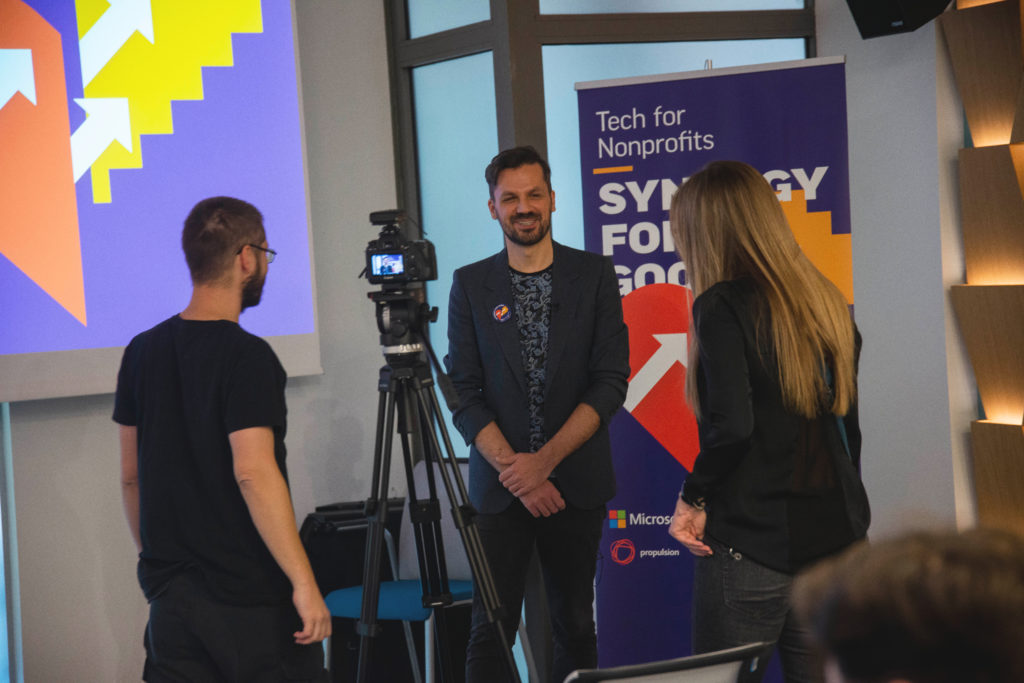“Synergy for Good: Tech for Nonprofits” event in Belgrade was organized by Propulsion, in cooperation with TechSoup Balkans and with support of Microsoft. The purpose of this event was to present a wide range of professional Microsoft resources and technologies available to nonprofits, Microsoft Teams and Microsoft Philanthropies Multi-country program, as well as the prospects for digital transformation in education by presenting the program “Gen-D – Nurturing a Digital Future”.
During the event, our partners presented what they are currently working on and what their organizations are committed to.
“For years now, with the help of Microsoft, Propulsion provides partner support to the development and work of the non-profit sector in Serbia and the region, but also enterprising individuals, in achieving the goal of changing society for the better. We have recognized ourselves as natural allies who share the view that the business and non-profit sector are not opposing ends of the market environment, but that through synergy and cooperation, each from its field of action, we can transform society and move it towards innovation, digitalization, new technologies. In that way, we give our contribution to the processes of strengthening the civil sector, but also to the improvement of formal and informal educational programs in Serbia and the region, through the introduction and promotion of programming and other digital resources”, said Goran Zarić, program director, Propulsion.

Ulan Karazhigitov (Modern Workplace Product Marketing Manager at Microsoft) presented Microsoft Teams, which is a communication platform that combines chat, video meetings, file storage (including collaboration on files), and application integration. What makes Teams practical is that you can also communicate with people who use other platforms, such as Skype. It also enables communication between people who don’t work in the same organization or company. Another advantage of Teams that Ulan talked about, and what makes it collaborative, is that it provides the option to work together on various documents, sharing them, posting, commenting, and tagging people, teams or even channels.
Vlado Rukavina, Philanthropies Coordinator, spoke on behalf of Microsoft and talked about a very important topic today, that is Corporate Social Responsibility and presented Microsoft Philanthropies program. Through programs and initiatives, their team supports Microsoft’s mission to empower every person and organization, by actively working to make the opportunities of the digital economy available to all. An interesting fact that Vlado shared with the participants is that in Serbia alone, in the last 10 years, Microsoft has supported 410 non-profit organizations with software donations worth 2 million dollars.

Stevan Marković, a Regional Manager at TechSoup Balkans, explained to the participants how to register as a nonprofit with Techsoup and obtain the Office 365 package. The value of TechSoup is that it brings together civil society organizations and donor partners, all with the goal of achieving the full potential of these organizations and providing the technologies, resources, and knowledge they need.
At this event, we also had a chance to present our “Gen-D – Nurturing a Digital Future” multi-country program that is implemented by Propulsion and powered by Microsoft, with the goal of contributing to the digital transformation in education. Five countries actively participate in the program: Albania, Bosnia and Herzegovina, Bulgaria, Croatia, and Serbia. The importance of this program is immeasurable because it provides knowledge in the field that is in great demand today in the Balkans, but in the world as well – IT. In cooperation with program partners (Petlja, eduIT, Programerko, Oficina, Digital National Alliance), one of its key activities is the localization of the prepared Coding Curriculum, i.e. translation and adaptation into local languages. That being said, students from five countries have access to the knowledge provided by the curriculum and therein lies the significance of this program.
